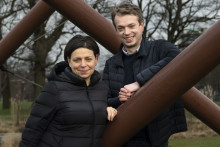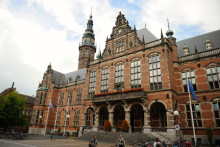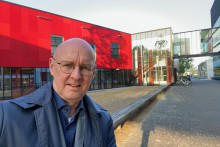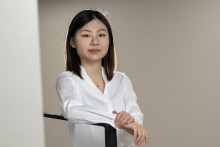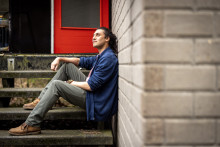Stratingh Institute for Chemistry
Nathalie Katsonis, Professor of Chemistry, and Tibor Kudernac, Associate Professor in the Molecular Nanofabrication group, both currently work at the Faculty of Science and Technology (TNW) at the UT. In April 2020, they will join the Stratingh Institute for Chemistry at the University of Groningen, where they will lead their own research groups. Katsonis will be appointed as Professor of Active Molecular Systems and Kudernac will become Associate Professor in Life-Like Supramolecular Mechanics.
The scientists have worked at the UT since 2011, for a large part of their careers, but it was in Groningen where their journey – as researchers and as a couple – began. They met in the lab of Ben Feringa, their mentor and one of the laureates of the 2016 Nobel Prize in Chemistry. And it is Groningen, where their path is leading them now. ‘We were offered a position in the Stratingh Institute, which was very attractive because we find its collegial spirit inspiring. We were approached together, people know that we are a package deal,’ says Katsonis.
'People know that we are a package deal'
They have been a package deal for a long time. The possibility of a dual career was one of the main reasons why they chose the University of Twente in the first place. Now, three parental leaves and a few ERC grants later, it is time for ‘a new challenge’, as they put it.
‘Grateful to the UT’
They will look back at the past nine years at the UT ‘very positively’, says Kudernac and his partner Katsonis elaborates: ‘So many good memories! We are grateful to the UT. We started here with nothing and had everything to prove. The university gave us the opportunity to develop our scientific personalities. And the fact that they offered us both a tenure track position was very progressive at the time. It was important for us to stay close to each other, for the welfare of our family and the equilibrium of our relationship. Our embedment at the UT allowed us to build a happy family. Especially since I got the idea to have three kids!’ She laughs.
Kudernac adds: ‘It is particularly difficult to start your own, independent research line from scratch. You have to be driven and creative of course, but you also need motivated people to surround you and an excellent infrastructure. We got that here. Enschede is also our family home. Two of our three kids were born here. The first years of a child’s life are so special and maybe the most memorable for their parents. And it is the same for research - the starting years are so stressful but also so very exciting. For us, all of this will forever be associated with Twente.’
‘Life is movement’
They are excited for the next chapter, though. ‘There are always mixed feelings,’ remarks Katsonis. ‘We’ve made so many good memories here. But we feel the drive to look ahead. We want to push our science and research forward.’ For Katsonis, this means exploring the rules of molecular movement. ‘Which has a connection to the origin of life,’ as she says. ‘Life is movement. Everything that matters in living systems—what makes the difference between something living and not living—is motion.’
For Kudernac, the move to Groningen also comes with a promotion and ‘independence in all aspects’. His research is also very much in line with the focus of the Stratingh Institute. ‘I look into the life of the cell with the eyes of a synthetic organic chemist, and with my team, we re-engineer the molecular machines that gives cells their shape and function.'
‘We never stop with science’
The connection between their work is not coincidental. On top of raising a family together, the couple has always collaborated professionally. ‘Chemistry is our calling, not just a job. We know everything about each other’s work,’ says Kudernac. Katsonis agrees: ‘Once the kids are asleep, we often start discussing science again. We are each other’s best reviewers and chemistry is a big part of our lives. We never stop with science.’



